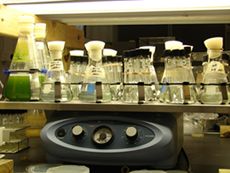Oil exploration in the lab
Lab grows algae in hopes of developing biofuel source
Research by Zhijian "Z.J." Pei and Wenqiao "Wayne" Yuan could advance the large-scale cultivation and manufacturing of oil-rich algae for biofuel.
 Pei, associate professor of industrial and manufacturing systems engineering, and Yuan, assistant professor of biological and agricultural engineering, have received a $98,560 Small Grant for Exploratory Research from the National Science Foundation to study solid carriers for manufacturing algae biofuels in the ocean.
Pei, associate professor of industrial and manufacturing systems engineering, and Yuan, assistant professor of biological and agricultural engineering, have received a $98,560 Small Grant for Exploratory Research from the National Science Foundation to study solid carriers for manufacturing algae biofuels in the ocean.
Algae are a diverse group of simple organisms that live in or near water. Certain species are high in oil that could be converted into such fuels as biodiesel, according to Pei and Yuan. Algae also have several environmental advantages over corn or other plants: They don't need soil or fresh water to grow.
Pei and Yuan are looking for the best materials to make floating carriers on which to grow algae.
"Some materials are better for algal attachment and growth than others,"Yuan said, "and we will be identifying what those 'good' materials are."
The project could help with the design of major equipment for manufacturing algae biofuels from the ocean, including solid carriers, in-ocean algae harvesting equipment and oil extraction machines, Pei said.
"This research aims to develop a cost-effective process for growing algae on solid carriers in the ocean for biofuel manufacturing," he said. "If successful, it will greatly benefit the energy security of the United States, as well as society in general."
The research will be conducted with a two-step approach.
"Selected algae species will be grown on solid carriers in a simulated ocean environment and will be evaluated for their ability to attach to solid carriers and grow in seawater, their biomass productivity, and their oil content," Pei said.
"Top-ranked species in step one will be selected to test the performance of several carrier materials, including natural organic, synthetic organic and inorganic materials, with the same evaluation parameters as in step one."
Pei said the properties of the highly-ranked carriers also will be analyzed.
Yuan, who has studied biodiesel for several years, said the major problem with making the fuel has been finding sustainable sources of oil and fat.
"Algae seems to be the only promising sustainable oil source for biodiesel production," he said. "In my lab, we have several different projects involving algae and we have been trying different ways to grow it. We have already obtained some encouraging results."
Pei said the project also will have an educational benefit, with K-State College of Engineering graduate and undergraduate students to be involved in the multidisciplinary research.
Pei, a K-State faculty member since 2000, has expertise in new process development, process modeling of silicon wafering, and traditional and nontraditional machining processes.
Pei earned his bachelor's from the Zhengzhou Institute of Technology and his master's from the Beijing Institute of Technology, both in China. His doctorate is from the University of Illinois at Urbana-Champaign.
Yuan, who joined K-State in 2006, has research interests in biofuels and biomaterials, diesel engine combustion and performance, and algae photobioreactor and bioprocessing systems.
He earned his bachelor's and master's degrees from China Agricultural University, and his doctorate from the University of Illinois at Urbana-Champaign.
Photo: Samples in Yuan and Pei's lab are part of their cultivation of oceanic algae that are high in oil. They're investigating which materials make the best carriers for cultivation.